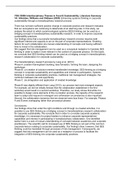YSS-33806 Interdisciplinary Themes in Food & Sustainability. Literature Summary
1A: Ahlström, Williams and Vildåsen (2020) Enhancing systems thinking in corporate
sustainability through a transdisciplinary research process
There has not been sufficient positive change in corporate practice and research indicates
that our ecosystems are continuing to deteriorate at an alarming rate. In this study, we
analyse the extent to which social-ecological systems (SES) thinking can be used as a
bridging concept in transdisciplinary sustainability research, in order to improve corporate
sustainability practices.
Our findings show that a successful transdisciplinary research process requires both
significant interest and capacity to act on the part of corporate representatives. Enabling
factors for such collaboration are mutual understanding of concepts and having sufficient
time to invest in the collaboration.
We suggest that risk management can be used as a conceptual metaphor to translate SES
thinking in order to make it more relevant in the context of corporate practice. On this basis,
we conclude that SES thinking indeed can be used as a bridging concept in transdisciplinary
research collaboration for corporate sustainability.
The transdisciplinary research process by Lang et al. (2012):
Phase A: problem framing/team building; idea formation, forming the team, designing the
workshops
Phase B: co-creation of solution-oriented transferable knowledge; SES thinking as a bridging
concept in corporate sustainability and capabilities and interest in participation, Systems
thinking in corporate sustainability practices, traditional risk management strategies, the
continuum between risk and opportunity.
Phase C: (re-)integration and application of created knowledge
Phase B was slightly different from Lang (2012): our process had more emergent aspects.
For example, we did not initially foresee that the collaboration established in the first
workshop would result in a second workshop. Therefore, our study shows that while it is
possible to design some elements of the co-creation process, the capacity of the research
team to adapt and respond to emergent and unforeseen circumstances is also important.
Second, the collaboration dynamics that we observed were less linear. For example, Phases
A and B were overlapping rather than processual phases.
Conclusions:
Our findings show that under the right conditions and through co-created activities, it is
possible to use SES thinking as a bridging concept in transdisciplinary research collaboration
for corporate sustainability. We conclude that in order to co-create corporate academic
knowledge, it is necessary for project leaders to enhance corporate representatives’
capabilities and interest in participating in transdisciplinary collaboration. One identified
barrier here is a lack of mutual understanding of concepts between academics and corporate
practitioners. The scientific call for increased use of SES thinking is not part of the common
corporate lexicon relating to corporate sustainability. Our findings show, however, that SES
thinking could be translated through processes of risk management. Consequently, we
suggest that risk management can be used as a metaphor or process to facilitate the
integration of SES thinking into corporate sustainability practices.
1
, 1B: Hospes, Kroeze, Oosterveer, Schouten and Slingerland (2017) New generation of
knowledge: towards an inter- and transdisciplinary framework for sustainable pathways of
palm oil production
The production and expansion of palm oil have emerged as a major and controversial issue
in political and public debates in the North and the South on sustainable food and agriculture.
Scientific research has played a marginal role in these debates that are characterized by
black and white views on palm oil as a good, bad or even ugly crop, and by solutions that are
limited in scope. Our first argument is that new conceptualization of the complexity and
dynamics of the palm oil sector can revitalize debate on sustainable palm oil and be used to
identify sustainable pathways for palm oil production. For this purpose, we develop an
interdisciplinary framework, conceptualizing the palm oil sector as consisting of systems,
flows and networks. Our second argument is that a transdisciplinary approach is needed
to identify and develop sustainable pathways. We present six ideas on how to do so. Given
the controversy in debates on the production and expansion of palm oil, we consider
switchers as critical actors for shaping sustainable pathways, both in the palm oil sector and
at the science-policy interface.
4 characteristics of political and public debates on palm oil production and expansion:
1) First, in many policy documents and media events different frames are used and
promoted, often based on conflicting notions or values of sustainability and
development. These frames are not explained, deliberated and reviewed. Result:
black and white view on palm oil (good vs. bad)
2) Second, both problem and solution frames are limited in scope.
3) Third, both problem and solutions frames are not based on, or geared towards, a
com-prehensive understanding of different components and dynamics of the palm oil
sector.
4) Fourth, insights from scientific research have played a marginal role in policymaking
on sustainable palm oil. For instance, scientists have not played a major role as
resource persons or advisors in the design of global or national standards for
sustainable palm oil -> main focus of the paper
Develop an interdisciplinary framework: to unravel complexity and dynamics of the palm oil
sector.
A transdisciplinary approach: “a reflexive principle [. . .] aiming at the solution or transition of
societal problem [. . .] by differentiating and integrating knowledge from various scientific and
societal bodies of knowledge.
2





